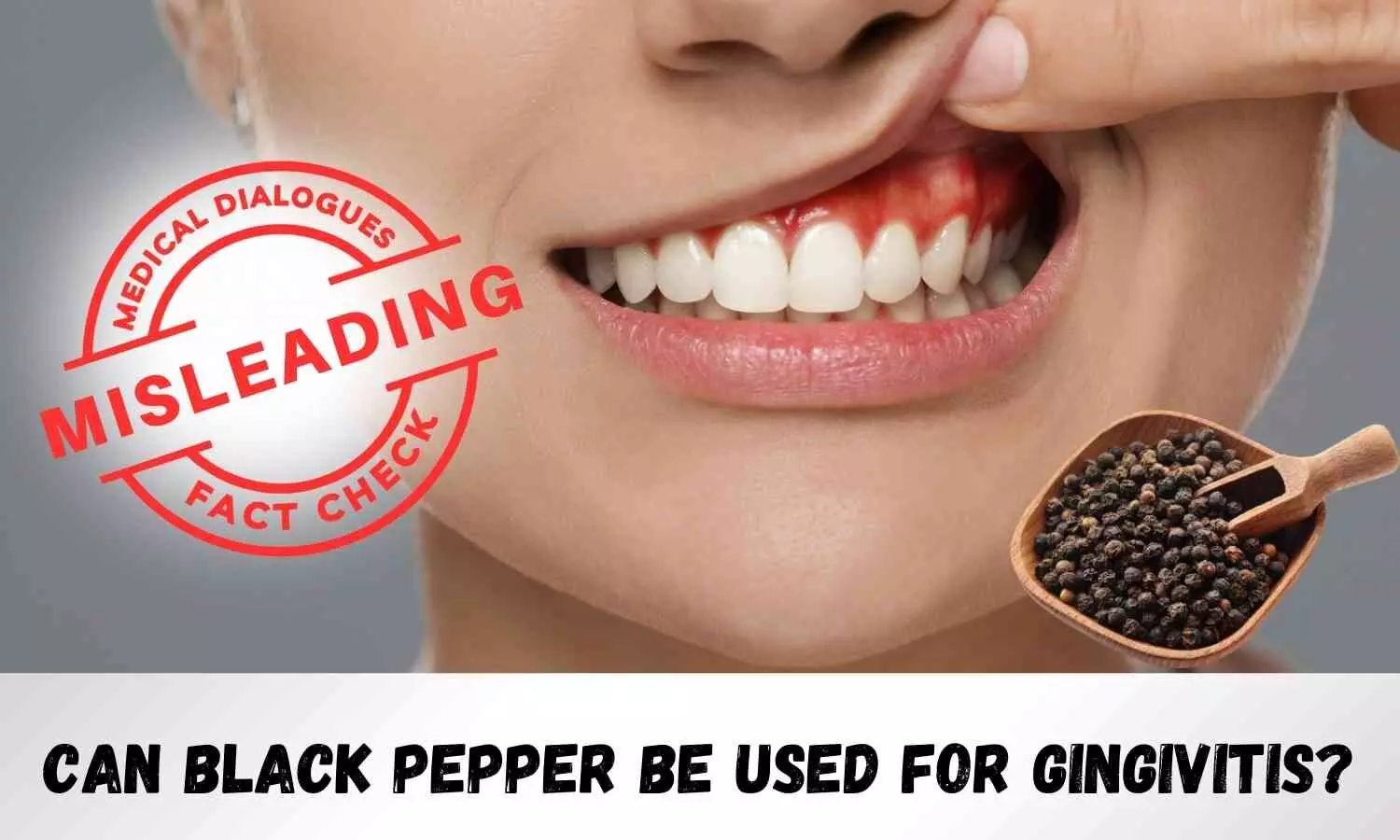Fact Check: Can Black Pepper Be Used for Gingivitis?

A Pinterest post claims that black pepper can be used for Gingivitis. The claim is Misleading.
Claim
A Pinterest post titled, " Black Pepper Health Benefits", claims that, "black pepper can be used for gingivitis."
In the post, the user Deena Barger states, " Black pepper, one of the most ancient and prolifically traded of spices, having been employed for culinary and medicinal use, such as for, colds, nasal congestion, diarrhoea, anaemia, improve blood circulation, heart and lung tonic, halitosis and relieve toothache, indigestion remedy, anti-inflammatory, cholera and syphilis, mild to moderate stomach complaints, hoarseness of voice and sore throat, gingivitis, minor cuts and bruises, rinse for wounds, helps to prevent or delay food spoilage."
Amongst other claims, the post makes a claim that black pepper can be used for gingivitis.
The post can be accessed here.
Fact Check
The claim is Misleading. Though black pepper has antiplaque and anti-inflammatory properties that reduce mild gingival inflammation, it is not a medically recommended therapy for treating gingivitis and, in certain cases, even cause more irritation, burning, or tingling sensation to the inflamed gingiva.
What is Gingiva?
The gingiva is the part of the oral mucosa that covers the alveolar processes of the jaws and surrounds the necks of the teeth and is divided anatomically into marginal, attached, and interdental areas.
Gingival tissues provide the framework for peripheral body defence. The tissues surrounding the teeth provide a seal around the teeth (via the junctional epithelium and the epithelial attachment). This seal helps withstand the friction caused by mastication and acts as a barrier to protect the space between the teeth and soft tissues from foreign invaders like microorganisms.
Gingivitis and Its Types
Gingivitis is an inflammatory condition of the gingival tissue or the gums most commonly due to bacterial infection. It is inflammation of the gingiva with the attachment of the connective tissue to the tooth remaining at the original level, that is, without attachment loss.
There are various types of Gingivitis such as plaque-induced gingivitis, necrotizing ulcerative gingivitis, medication-influenced gingivitis, allergic gingivitis, specific infection-related gingivitis, and systemic diseases gingivitis.
Plaque-induced gingivitis is caused by bacterial plaque which acts to initiate the body's host response and in turn can lead to the destruction of the gingival tissues, which may progress to the destruction of the periodontal attachment apparatus.
Necrotizing ulcerative gingivitis(NUG) also called as acute necrotizing ulcerative gingivitis(ANUG), frequently occurs in the presence of psychological stress. decreased neutrophilic chemotaxis and phagocytic response. Stress-related epinephrine may result in localized ischemia, which pre-disposes the gingiva to NUG. Other factors have also been related to an increased frequency of NUG like immunosuppression, smoking, local trauma, poor nutritional status. Along with strong bacterial association, some controversial research has suggested that viruses such as cytomegalovirus, Epstein-Barr virus, and herpes simplex may contribute to the onset and progression of NUG.
Medication-influenced gingivitis refers to abnormal growth of the gingival tissues secondary to the use of systemic medication. This increased gingival size is due to an increased amount of extracellular matrix, predominantly collagen. Investigators have suggested that cyclosporine, phenytoin, and nifedipine are all associated with calcium deregulation, which disrupts the normal collagen phagocytosis and remodelling process.
Specific infection-related gingivitis is caused by bacterial, viral and fungal infections. Bacterial infection-related gingivitis manifests as fiery red, edematous, and painful ulcerations, asymptomatic chancres, mucous patches or atypical non-ulcerated, highly inflamed gingiva which is commonly caused by certain bacterias such as Neisseria gonorrhoeae, Treponema pallidum, streptococci, Mycobacterium chelonae. Moreover, viral infection-related gingivitis may appear asymptomatic as primary infection but can manifest as severe gingivostomatitis, in which the gingiva is painful, inflammed and ulcerated. Fever and lymphadenopathy are classic features and affected individuals experience difficulty chewing, they are commonly caused by herpes simplex virus type 1 (HSV-1) and 2 (HSV-2) and varicella-zoster virus. Gingival inflammation can also result from fungal infections, including conditions like candidosis, linear gingival erythema, and histoplasmosis.
Allergic Gingivitis may occur from different types of allergens such as a brand of herbal toothpaste, a specific type of mint candy, and peppers used for cooking and many variable lists of allergens that require a thorough evaluation.
Systemic diseases gingivitis include gingival manifestations associated with systemic conditions such as gastrointestinal diseases (e.g., Crohn’s disease), leukaemia, and diabetes mellitus.
Black Pepper and Its Benefits
Black pepper belongs to the Piperaceae family which comprises over 1000 species with tropical and subtropical distribution. Black pepper, with piperine as an active ingredient, contains volatile oil, oleoresins, and alkaloids. Major alkaloids present in black pepper are piperine, chavicine, piperidine, and piperetine.
Black pepper has antioxidant potential, anti-inflammatory potential, and antimicrobial potential, it may also prevent or treat gastrointestinal problems. Black pepper enhances the production of hydrochloric acid from the stomach thus improving digestion through the stimulation of histamine H2 receptors. In addition, black pepper has diaphoretic (promotes sweating), and diuretic (promotes urination) properties.
Black pepper and piperine improved the bioavailability of some phytochemicals like curcumin, catechins, etc. The mechanisms for these observed effects include the ability to promote rapid absorption, protection from chemical reactions in the gastrointestinal tract, and protection against oxidative damage thus it helps in improvement in drugs and phytochemicals delivery.
Black pepper also presents with neuroprotective potential, also anticancer perspectives of black pepper include modulation of phase-I, and phase-II detoxification systems, inhibition of lipid peroxidation, and indeed improvement in antioxidant status.
Piperine present in black pepper may cause a dose-dependent decrease in mean arterial pressure. In addition, Piperine (20 mg/kg/day) decreased the blood pressure caused by the blockage of voltage-dependent calcium channels.
Can Black Pepper be used for Gingivitis?
Black pepper does offer certain health benefits which include its antiinflammatory, and antimicrobial properties, neuroprotective potential. In addition, black pepper has anti-plaque and anti-inflammatory properties that reduce gingival inflammation and bleeding.
A study article published in the Journal of Traditional and Complementary Medicine suggests that the inhibitory action of piperine (the active ingredient of black pepper) on nitric oxide production and tumour necrosis factor-alpha production, which have a known role in the pathology of inflammation in periodontal disease. Additionally, piperine could be used as a potential therapeutic tool to regulate inflammatory responses and may prevent/attenuate carcinogenesis. Piperine may also inhibit lipopolysaccharide (LPS)-induced inflammatory responses and leukocyte accumulation.
Another study led by Deepak Dwivedi et. al. found that piperine has a significant anti-biofilm effect of Streptococcus mutans.
Yet one more study featured in the journal Gels demonstrated that piperine-loaded in situ gels have shown effectiveness in their anti-plaque and anti-inflammatory roles in patients with periodontitis.
An article featured in the Journal of Interdisciplinary Dentistry found that golden paste, composed of turmeric, virgin coconut oil, and black pepper, when applied topically, may reduce inflammation and bleeding in gingival disease, especially when used in combination with scaling.
Having said that, back pepper is spicy and may cause a burning sensation and irritation to swollen gums. Although black pepper has the potential to reduce gingival inflammation to a certain extent there is no scientific evidence or medical consensus to support the claim that black pepper alone should be used or is a recommended therapy for gingivitis.
The Medical Dialogues Fact Check Team spoke with Dr. Prinita Tirkey, MDS Periodontist, Rajmata Smt. Devendra Kumari Singh Deo Govt Medical College and Hospital Ambikapur, C.G. and she said, "We believe that black pepper, when combined with other natural ingredients, may offer some potential benefits for oral health. However, it is not something we recommend as a treatment for gingivitis. Gingivitis alone is a symptom that has numerous underlying causes like plaque accumulation, hormonal reasons medications, bacterial infections and many more. Additionally, since black pepper is spicy it may cause a burning or tingling sensation when applied directly over inflamed gingiva. While black pepper might contribute to reducing inflammation in certain formulations, relying solely on black pepper for gum health is not recommended. Managing gingivitis requires proven treatments and proper dental care to ensure effective results."
Dr. Akash Kumar Swarnkar, Dr Swarnkar’s Dental clinic, Bhilai, Durg (C.G.), added, "As dental professionals, we acknowledge that natural ingredients like black pepper may offer certain supportive benefits for oral health when used in combination with other treatments but it should not be viewed as a primary solution for managing gingivitis. Natural ingredients can be a helpful addition to maintaining oral health, but they cannot replace proper daily care routines for managing gum disease effectively and preventing further complications."
Medical Dialogues Final Take
Black pepper, particularly through its active compound piperine, offers notable health benefits, including anti-inflammatory and antimicrobial properties. Its potential in reducing gingival inflammation and bleeding has been suggested, especially when combined with other natural ingredients like turmeric and virgin coconut oil. However, there's no scientific evidence that black pepper can be used for gingivitis. Hence, the claim that black pepper can be used for gingivitis is MIsleading.



